Staff Development and Engagement Training: Royal Hotel Analysis
VerifiedAdded on 2022/12/19
|11
|3382
|27
Essay
AI Summary
This essay critically analyzes staff development and engagement within the hospitality industry, focusing on The Royal Hotel as a case study. It explores systematic approaches to performance management, outlining planning, coaching, reviewing, and action phases, while highlighting both benefits and limitations. The essay further examines team development stages, referencing Bruce Tuckman's model and applying it to The Royal Hotel's context. The discussion extends to leadership in the 21st century, emphasizing adaptability, team orientation, and innovation. The essay also addresses conflict management skills and strategies essential for leadership development, providing a comprehensive overview of key concepts in human resource management within the hospitality sector.
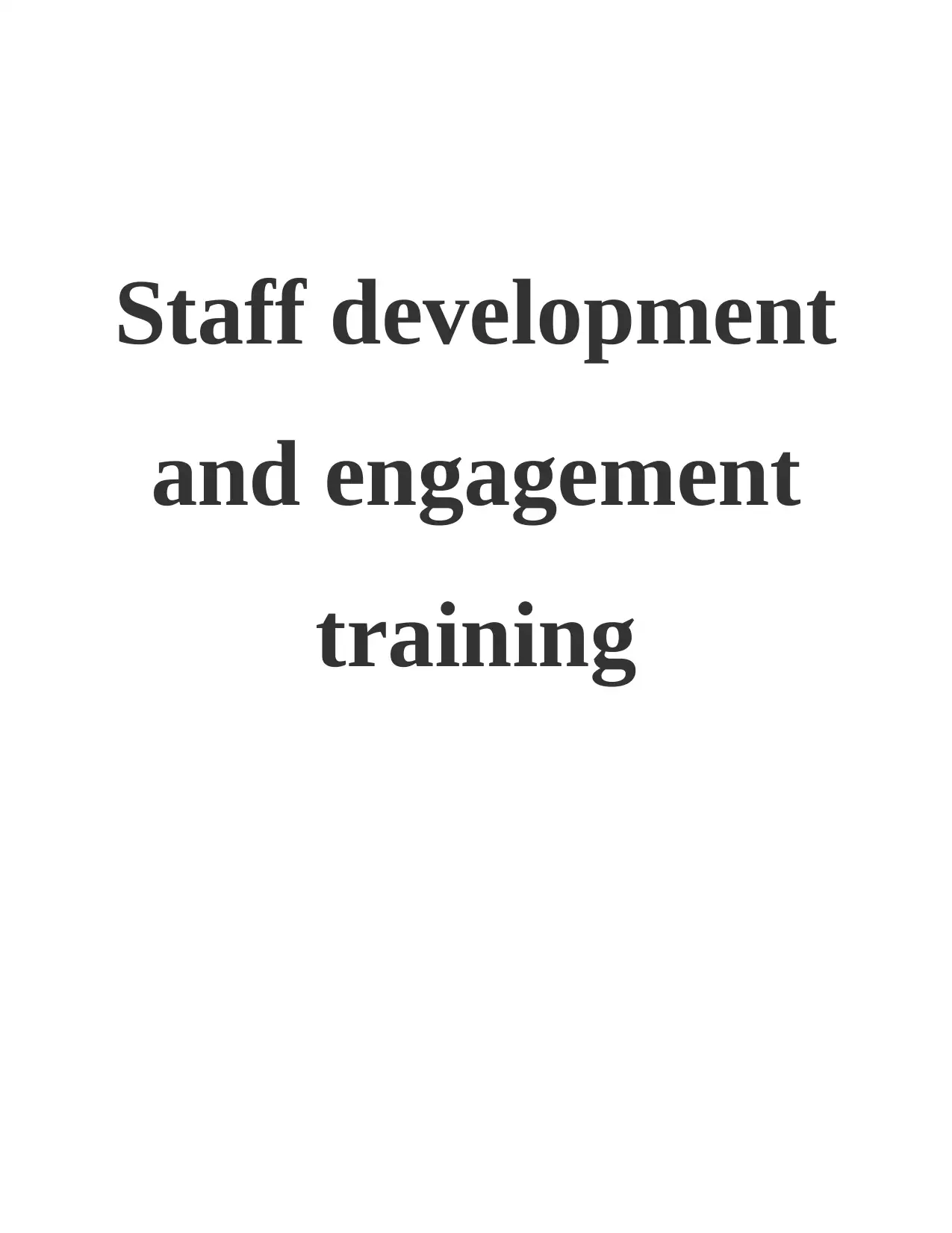
Staff development
and engagement
training
and engagement
training
Paraphrase This Document
Need a fresh take? Get an instant paraphrase of this document with our AI Paraphraser
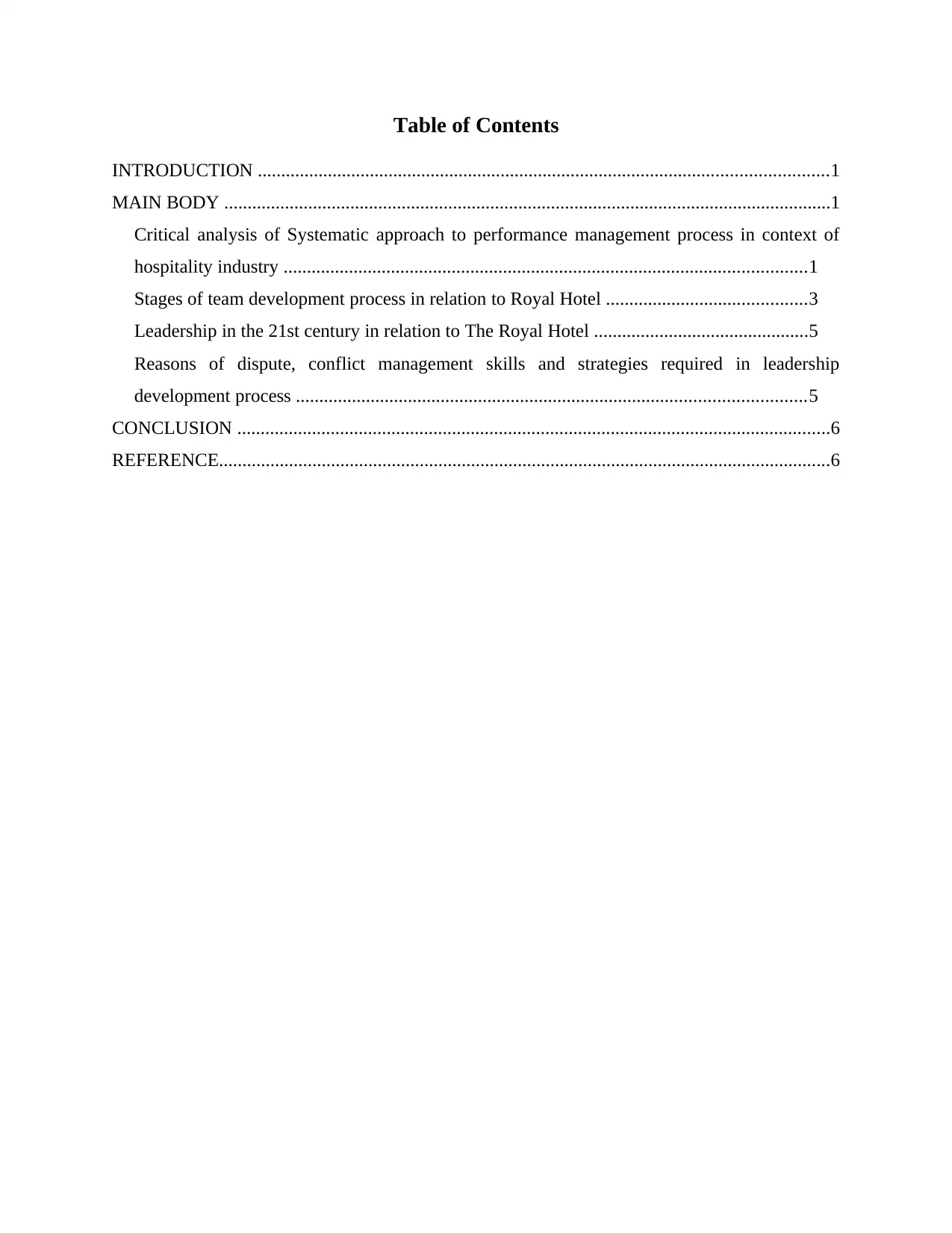
Table of Contents
INTRODUCTION ..........................................................................................................................1
MAIN BODY ..................................................................................................................................1
Critical analysis of Systematic approach to performance management process in context of
hospitality industry ................................................................................................................1
Stages of team development process in relation to Royal Hotel ...........................................3
Leadership in the 21st century in relation to The Royal Hotel ..............................................5
Reasons of dispute, conflict management skills and strategies required in leadership
development process .............................................................................................................5
CONCLUSION ...............................................................................................................................6
REFERENCE...................................................................................................................................6
INTRODUCTION ..........................................................................................................................1
MAIN BODY ..................................................................................................................................1
Critical analysis of Systematic approach to performance management process in context of
hospitality industry ................................................................................................................1
Stages of team development process in relation to Royal Hotel ...........................................3
Leadership in the 21st century in relation to The Royal Hotel ..............................................5
Reasons of dispute, conflict management skills and strategies required in leadership
development process .............................................................................................................5
CONCLUSION ...............................................................................................................................6
REFERENCE...................................................................................................................................6
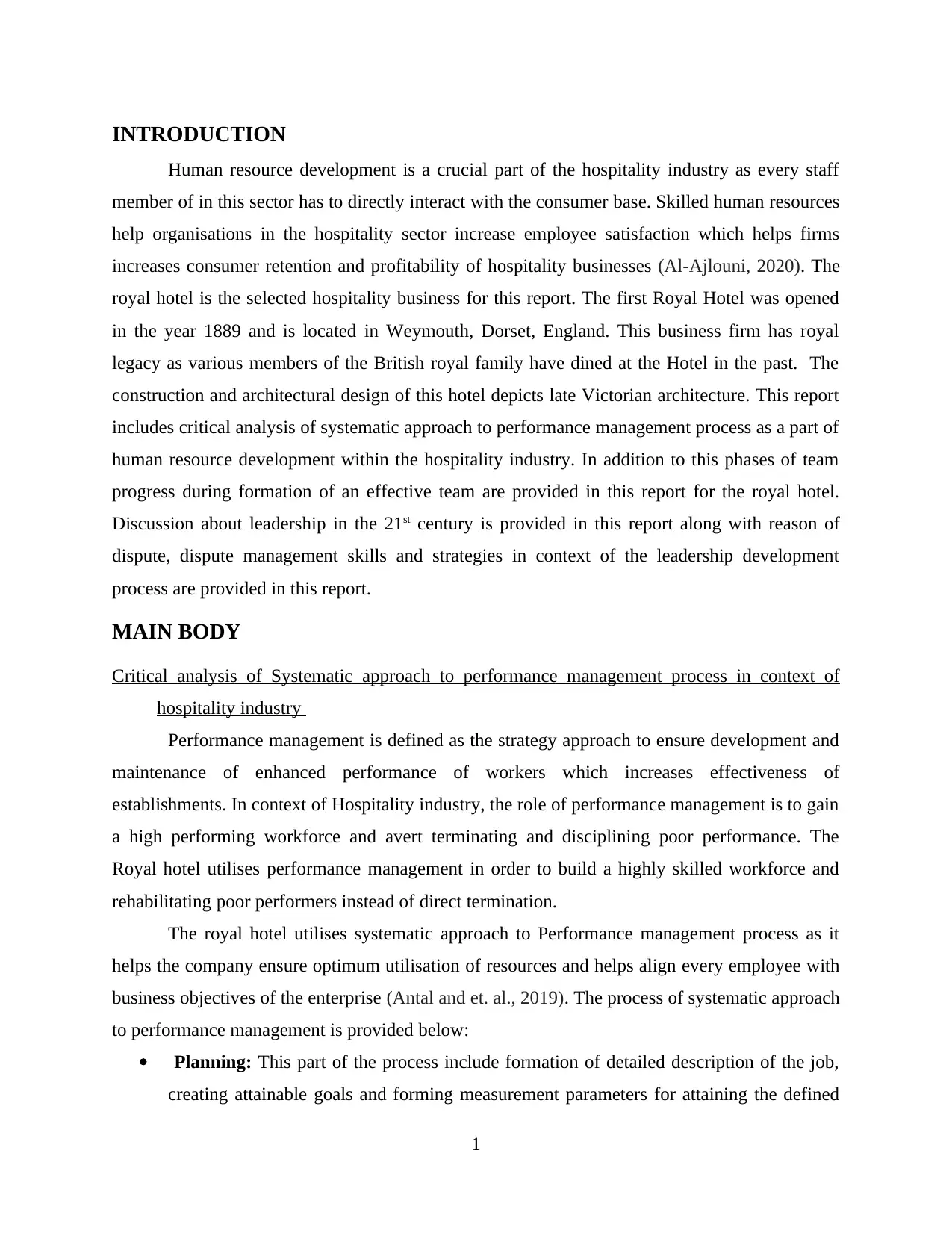
INTRODUCTION
Human resource development is a crucial part of the hospitality industry as every staff
member of in this sector has to directly interact with the consumer base. Skilled human resources
help organisations in the hospitality sector increase employee satisfaction which helps firms
increases consumer retention and profitability of hospitality businesses (Al-Ajlouni, 2020). The
royal hotel is the selected hospitality business for this report. The first Royal Hotel was opened
in the year 1889 and is located in Weymouth, Dorset, England. This business firm has royal
legacy as various members of the British royal family have dined at the Hotel in the past. The
construction and architectural design of this hotel depicts late Victorian architecture. This report
includes critical analysis of systematic approach to performance management process as a part of
human resource development within the hospitality industry. In addition to this phases of team
progress during formation of an effective team are provided in this report for the royal hotel.
Discussion about leadership in the 21st century is provided in this report along with reason of
dispute, dispute management skills and strategies in context of the leadership development
process are provided in this report.
MAIN BODY
Critical analysis of Systematic approach to performance management process in context of
hospitality industry
Performance management is defined as the strategy approach to ensure development and
maintenance of enhanced performance of workers which increases effectiveness of
establishments. In context of Hospitality industry, the role of performance management is to gain
a high performing workforce and avert terminating and disciplining poor performance. The
Royal hotel utilises performance management in order to build a highly skilled workforce and
rehabilitating poor performers instead of direct termination.
The royal hotel utilises systematic approach to Performance management process as it
helps the company ensure optimum utilisation of resources and helps align every employee with
business objectives of the enterprise (Antal and et. al., 2019). The process of systematic approach
to performance management is provided below:
Planning: This part of the process include formation of detailed description of the job,
creating attainable goals and forming measurement parameters for attaining the defined
1
Human resource development is a crucial part of the hospitality industry as every staff
member of in this sector has to directly interact with the consumer base. Skilled human resources
help organisations in the hospitality sector increase employee satisfaction which helps firms
increases consumer retention and profitability of hospitality businesses (Al-Ajlouni, 2020). The
royal hotel is the selected hospitality business for this report. The first Royal Hotel was opened
in the year 1889 and is located in Weymouth, Dorset, England. This business firm has royal
legacy as various members of the British royal family have dined at the Hotel in the past. The
construction and architectural design of this hotel depicts late Victorian architecture. This report
includes critical analysis of systematic approach to performance management process as a part of
human resource development within the hospitality industry. In addition to this phases of team
progress during formation of an effective team are provided in this report for the royal hotel.
Discussion about leadership in the 21st century is provided in this report along with reason of
dispute, dispute management skills and strategies in context of the leadership development
process are provided in this report.
MAIN BODY
Critical analysis of Systematic approach to performance management process in context of
hospitality industry
Performance management is defined as the strategy approach to ensure development and
maintenance of enhanced performance of workers which increases effectiveness of
establishments. In context of Hospitality industry, the role of performance management is to gain
a high performing workforce and avert terminating and disciplining poor performance. The
Royal hotel utilises performance management in order to build a highly skilled workforce and
rehabilitating poor performers instead of direct termination.
The royal hotel utilises systematic approach to Performance management process as it
helps the company ensure optimum utilisation of resources and helps align every employee with
business objectives of the enterprise (Antal and et. al., 2019). The process of systematic approach
to performance management is provided below:
Planning: This part of the process include formation of detailed description of the job,
creating attainable goals and forming measurement parameters for attaining the defined
1
⊘ This is a preview!⊘
Do you want full access?
Subscribe today to unlock all pages.

Trusted by 1+ million students worldwide
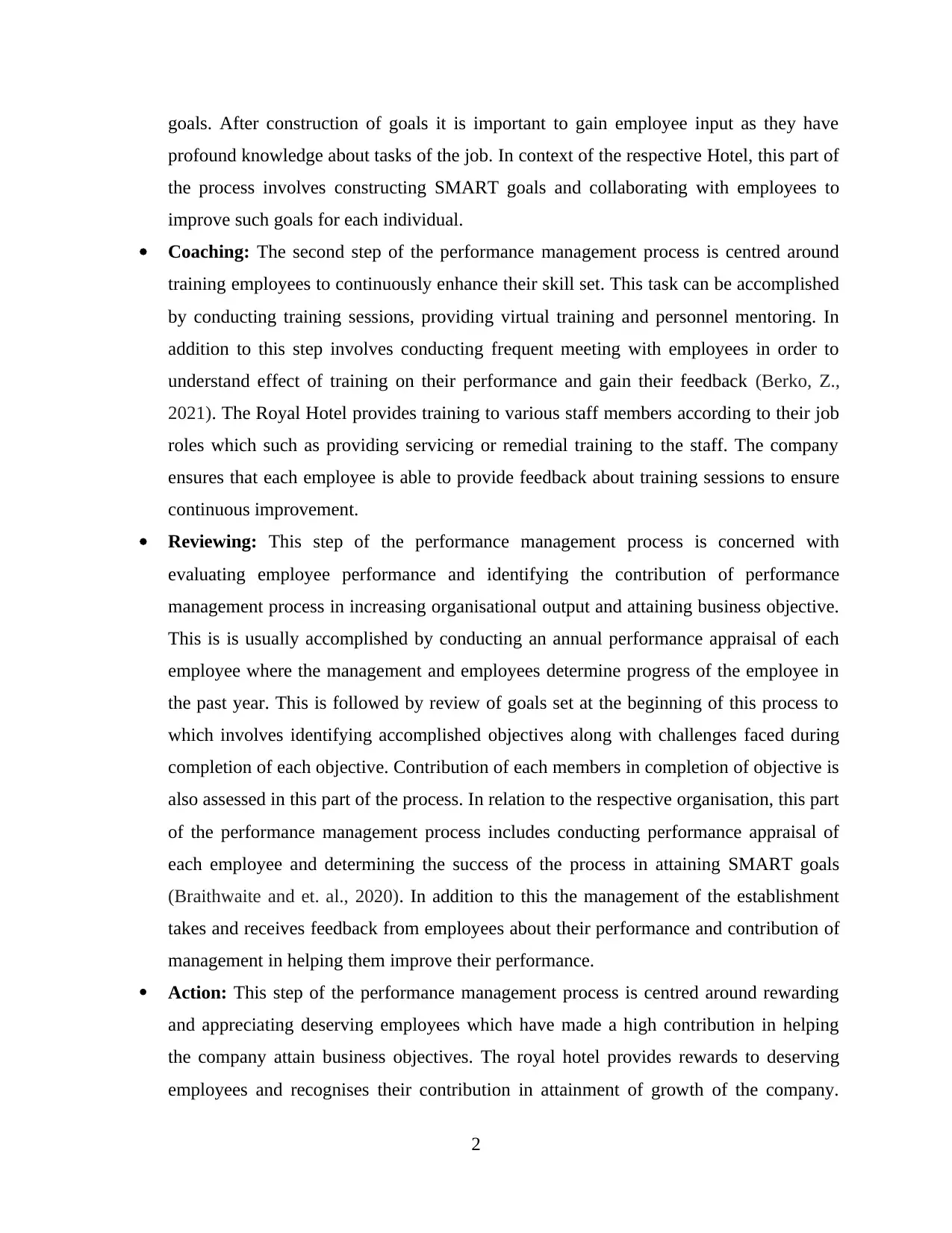
goals. After construction of goals it is important to gain employee input as they have
profound knowledge about tasks of the job. In context of the respective Hotel, this part of
the process involves constructing SMART goals and collaborating with employees to
improve such goals for each individual.
Coaching: The second step of the performance management process is centred around
training employees to continuously enhance their skill set. This task can be accomplished
by conducting training sessions, providing virtual training and personnel mentoring. In
addition to this step involves conducting frequent meeting with employees in order to
understand effect of training on their performance and gain their feedback (Berko, Z.,
2021). The Royal Hotel provides training to various staff members according to their job
roles which such as providing servicing or remedial training to the staff. The company
ensures that each employee is able to provide feedback about training sessions to ensure
continuous improvement.
Reviewing: This step of the performance management process is concerned with
evaluating employee performance and identifying the contribution of performance
management process in increasing organisational output and attaining business objective.
This is is usually accomplished by conducting an annual performance appraisal of each
employee where the management and employees determine progress of the employee in
the past year. This is followed by review of goals set at the beginning of this process to
which involves identifying accomplished objectives along with challenges faced during
completion of each objective. Contribution of each members in completion of objective is
also assessed in this part of the process. In relation to the respective organisation, this part
of the performance management process includes conducting performance appraisal of
each employee and determining the success of the process in attaining SMART goals
(Braithwaite and et. al., 2020). In addition to this the management of the establishment
takes and receives feedback from employees about their performance and contribution of
management in helping them improve their performance.
Action: This step of the performance management process is centred around rewarding
and appreciating deserving employees which have made a high contribution in helping
the company attain business objectives. The royal hotel provides rewards to deserving
employees and recognises their contribution in attainment of growth of the company.
2
profound knowledge about tasks of the job. In context of the respective Hotel, this part of
the process involves constructing SMART goals and collaborating with employees to
improve such goals for each individual.
Coaching: The second step of the performance management process is centred around
training employees to continuously enhance their skill set. This task can be accomplished
by conducting training sessions, providing virtual training and personnel mentoring. In
addition to this step involves conducting frequent meeting with employees in order to
understand effect of training on their performance and gain their feedback (Berko, Z.,
2021). The Royal Hotel provides training to various staff members according to their job
roles which such as providing servicing or remedial training to the staff. The company
ensures that each employee is able to provide feedback about training sessions to ensure
continuous improvement.
Reviewing: This step of the performance management process is concerned with
evaluating employee performance and identifying the contribution of performance
management process in increasing organisational output and attaining business objective.
This is is usually accomplished by conducting an annual performance appraisal of each
employee where the management and employees determine progress of the employee in
the past year. This is followed by review of goals set at the beginning of this process to
which involves identifying accomplished objectives along with challenges faced during
completion of each objective. Contribution of each members in completion of objective is
also assessed in this part of the process. In relation to the respective organisation, this part
of the performance management process includes conducting performance appraisal of
each employee and determining the success of the process in attaining SMART goals
(Braithwaite and et. al., 2020). In addition to this the management of the establishment
takes and receives feedback from employees about their performance and contribution of
management in helping them improve their performance.
Action: This step of the performance management process is centred around rewarding
and appreciating deserving employees which have made a high contribution in helping
the company attain business objectives. The royal hotel provides rewards to deserving
employees and recognises their contribution in attainment of growth of the company.
2
Paraphrase This Document
Need a fresh take? Get an instant paraphrase of this document with our AI Paraphraser
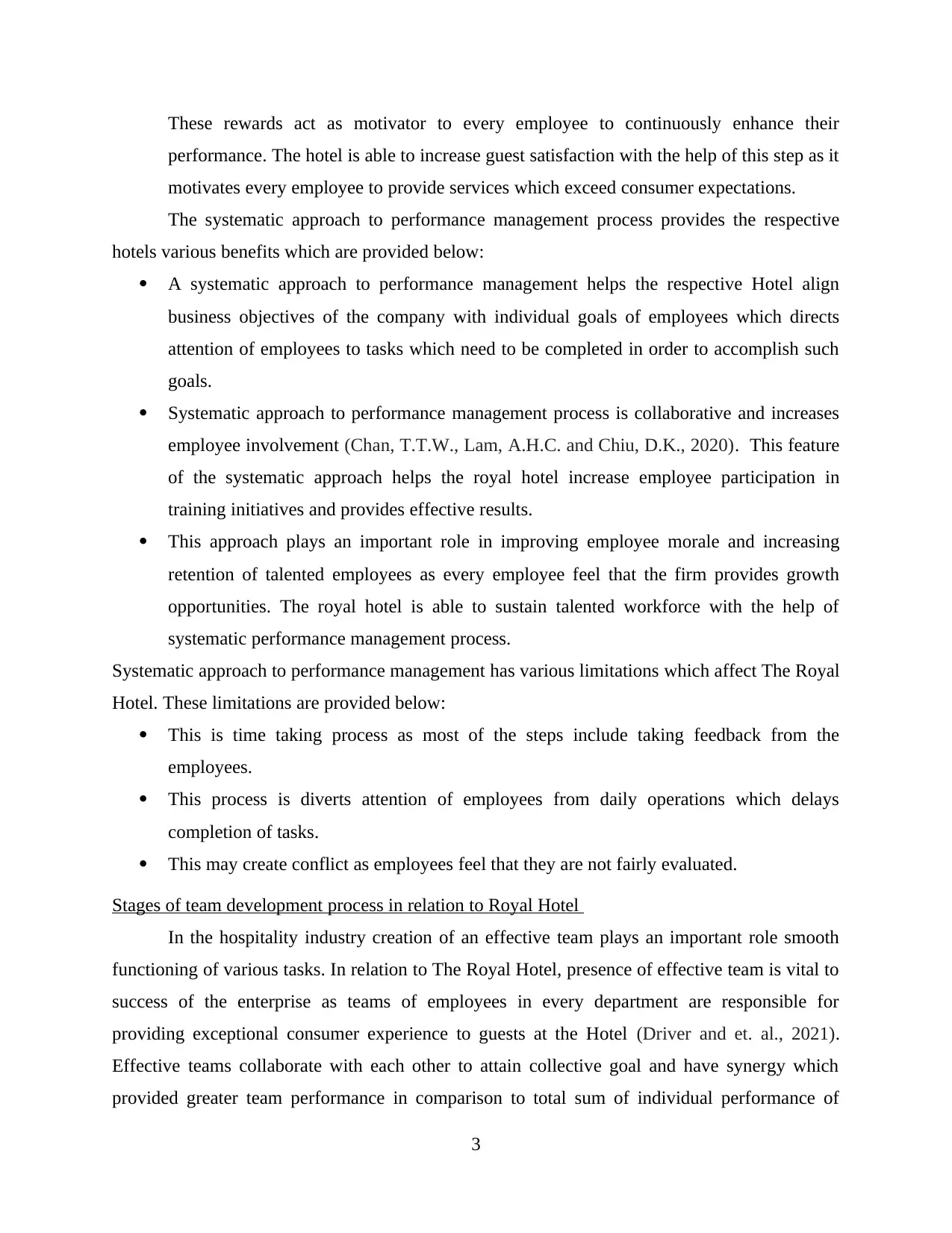
These rewards act as motivator to every employee to continuously enhance their
performance. The hotel is able to increase guest satisfaction with the help of this step as it
motivates every employee to provide services which exceed consumer expectations.
The systematic approach to performance management process provides the respective
hotels various benefits which are provided below:
A systematic approach to performance management helps the respective Hotel align
business objectives of the company with individual goals of employees which directs
attention of employees to tasks which need to be completed in order to accomplish such
goals.
Systematic approach to performance management process is collaborative and increases
employee involvement (Chan, T.T.W., Lam, A.H.C. and Chiu, D.K., 2020). This feature
of the systematic approach helps the royal hotel increase employee participation in
training initiatives and provides effective results.
This approach plays an important role in improving employee morale and increasing
retention of talented employees as every employee feel that the firm provides growth
opportunities. The royal hotel is able to sustain talented workforce with the help of
systematic performance management process.
Systematic approach to performance management has various limitations which affect The Royal
Hotel. These limitations are provided below:
This is time taking process as most of the steps include taking feedback from the
employees.
This process is diverts attention of employees from daily operations which delays
completion of tasks.
This may create conflict as employees feel that they are not fairly evaluated.
Stages of team development process in relation to Royal Hotel
In the hospitality industry creation of an effective team plays an important role smooth
functioning of various tasks. In relation to The Royal Hotel, presence of effective team is vital to
success of the enterprise as teams of employees in every department are responsible for
providing exceptional consumer experience to guests at the Hotel (Driver and et. al., 2021).
Effective teams collaborate with each other to attain collective goal and have synergy which
provided greater team performance in comparison to total sum of individual performance of
3
performance. The hotel is able to increase guest satisfaction with the help of this step as it
motivates every employee to provide services which exceed consumer expectations.
The systematic approach to performance management process provides the respective
hotels various benefits which are provided below:
A systematic approach to performance management helps the respective Hotel align
business objectives of the company with individual goals of employees which directs
attention of employees to tasks which need to be completed in order to accomplish such
goals.
Systematic approach to performance management process is collaborative and increases
employee involvement (Chan, T.T.W., Lam, A.H.C. and Chiu, D.K., 2020). This feature
of the systematic approach helps the royal hotel increase employee participation in
training initiatives and provides effective results.
This approach plays an important role in improving employee morale and increasing
retention of talented employees as every employee feel that the firm provides growth
opportunities. The royal hotel is able to sustain talented workforce with the help of
systematic performance management process.
Systematic approach to performance management has various limitations which affect The Royal
Hotel. These limitations are provided below:
This is time taking process as most of the steps include taking feedback from the
employees.
This process is diverts attention of employees from daily operations which delays
completion of tasks.
This may create conflict as employees feel that they are not fairly evaluated.
Stages of team development process in relation to Royal Hotel
In the hospitality industry creation of an effective team plays an important role smooth
functioning of various tasks. In relation to The Royal Hotel, presence of effective team is vital to
success of the enterprise as teams of employees in every department are responsible for
providing exceptional consumer experience to guests at the Hotel (Driver and et. al., 2021).
Effective teams collaborate with each other to attain collective goal and have synergy which
provided greater team performance in comparison to total sum of individual performance of
3
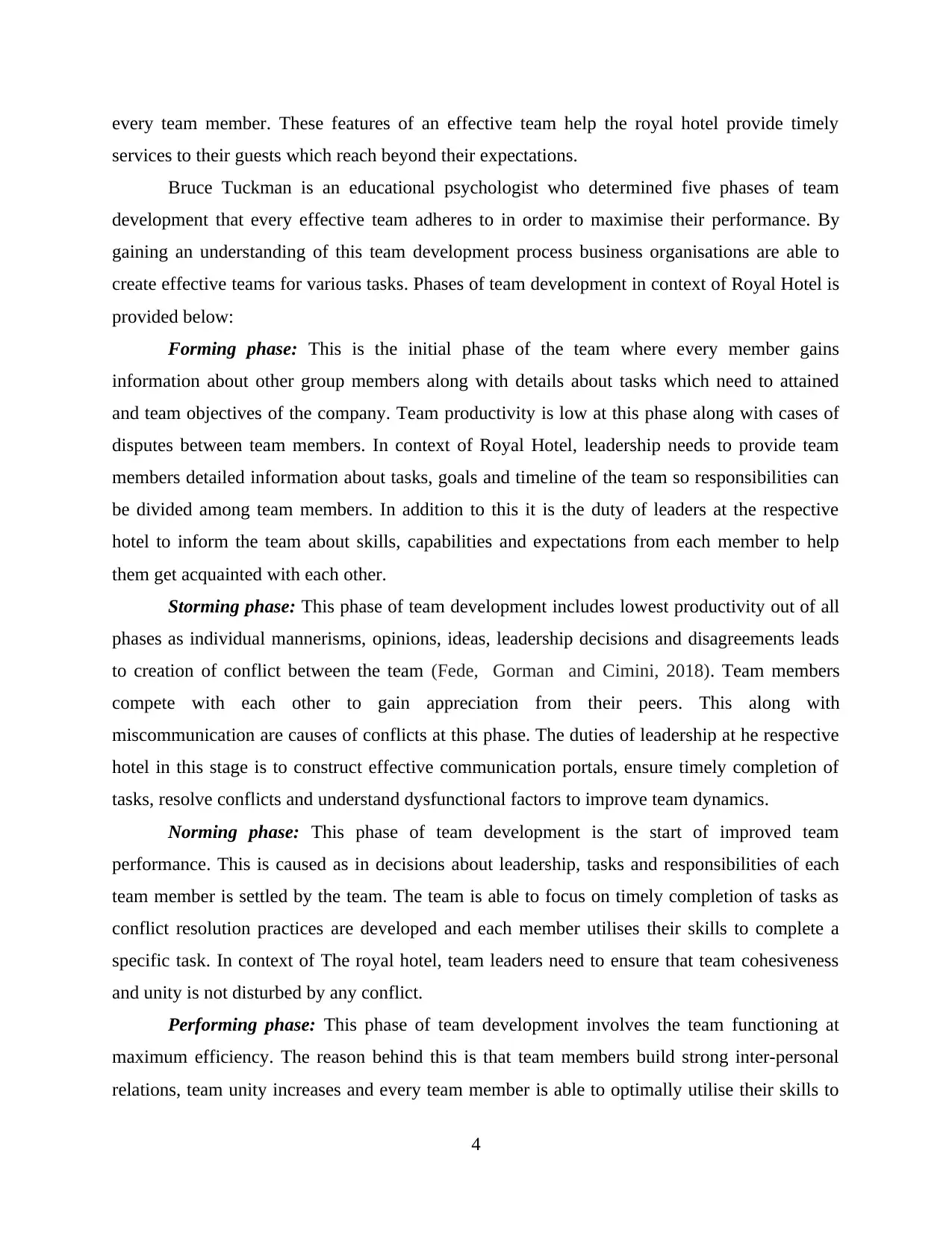
every team member. These features of an effective team help the royal hotel provide timely
services to their guests which reach beyond their expectations.
Bruce Tuckman is an educational psychologist who determined five phases of team
development that every effective team adheres to in order to maximise their performance. By
gaining an understanding of this team development process business organisations are able to
create effective teams for various tasks. Phases of team development in context of Royal Hotel is
provided below:
Forming phase: This is the initial phase of the team where every member gains
information about other group members along with details about tasks which need to attained
and team objectives of the company. Team productivity is low at this phase along with cases of
disputes between team members. In context of Royal Hotel, leadership needs to provide team
members detailed information about tasks, goals and timeline of the team so responsibilities can
be divided among team members. In addition to this it is the duty of leaders at the respective
hotel to inform the team about skills, capabilities and expectations from each member to help
them get acquainted with each other.
Storming phase: This phase of team development includes lowest productivity out of all
phases as individual mannerisms, opinions, ideas, leadership decisions and disagreements leads
to creation of conflict between the team (Fede, Gorman and Cimini, 2018). Team members
compete with each other to gain appreciation from their peers. This along with
miscommunication are causes of conflicts at this phase. The duties of leadership at he respective
hotel in this stage is to construct effective communication portals, ensure timely completion of
tasks, resolve conflicts and understand dysfunctional factors to improve team dynamics.
Norming phase: This phase of team development is the start of improved team
performance. This is caused as in decisions about leadership, tasks and responsibilities of each
team member is settled by the team. The team is able to focus on timely completion of tasks as
conflict resolution practices are developed and each member utilises their skills to complete a
specific task. In context of The royal hotel, team leaders need to ensure that team cohesiveness
and unity is not disturbed by any conflict.
Performing phase: This phase of team development involves the team functioning at
maximum efficiency. The reason behind this is that team members build strong inter-personal
relations, team unity increases and every team member is able to optimally utilise their skills to
4
services to their guests which reach beyond their expectations.
Bruce Tuckman is an educational psychologist who determined five phases of team
development that every effective team adheres to in order to maximise their performance. By
gaining an understanding of this team development process business organisations are able to
create effective teams for various tasks. Phases of team development in context of Royal Hotel is
provided below:
Forming phase: This is the initial phase of the team where every member gains
information about other group members along with details about tasks which need to attained
and team objectives of the company. Team productivity is low at this phase along with cases of
disputes between team members. In context of Royal Hotel, leadership needs to provide team
members detailed information about tasks, goals and timeline of the team so responsibilities can
be divided among team members. In addition to this it is the duty of leaders at the respective
hotel to inform the team about skills, capabilities and expectations from each member to help
them get acquainted with each other.
Storming phase: This phase of team development includes lowest productivity out of all
phases as individual mannerisms, opinions, ideas, leadership decisions and disagreements leads
to creation of conflict between the team (Fede, Gorman and Cimini, 2018). Team members
compete with each other to gain appreciation from their peers. This along with
miscommunication are causes of conflicts at this phase. The duties of leadership at he respective
hotel in this stage is to construct effective communication portals, ensure timely completion of
tasks, resolve conflicts and understand dysfunctional factors to improve team dynamics.
Norming phase: This phase of team development is the start of improved team
performance. This is caused as in decisions about leadership, tasks and responsibilities of each
team member is settled by the team. The team is able to focus on timely completion of tasks as
conflict resolution practices are developed and each member utilises their skills to complete a
specific task. In context of The royal hotel, team leaders need to ensure that team cohesiveness
and unity is not disturbed by any conflict.
Performing phase: This phase of team development involves the team functioning at
maximum efficiency. The reason behind this is that team members build strong inter-personal
relations, team unity increases and every team member is able to optimally utilise their skills to
4
⊘ This is a preview!⊘
Do you want full access?
Subscribe today to unlock all pages.

Trusted by 1+ million students worldwide
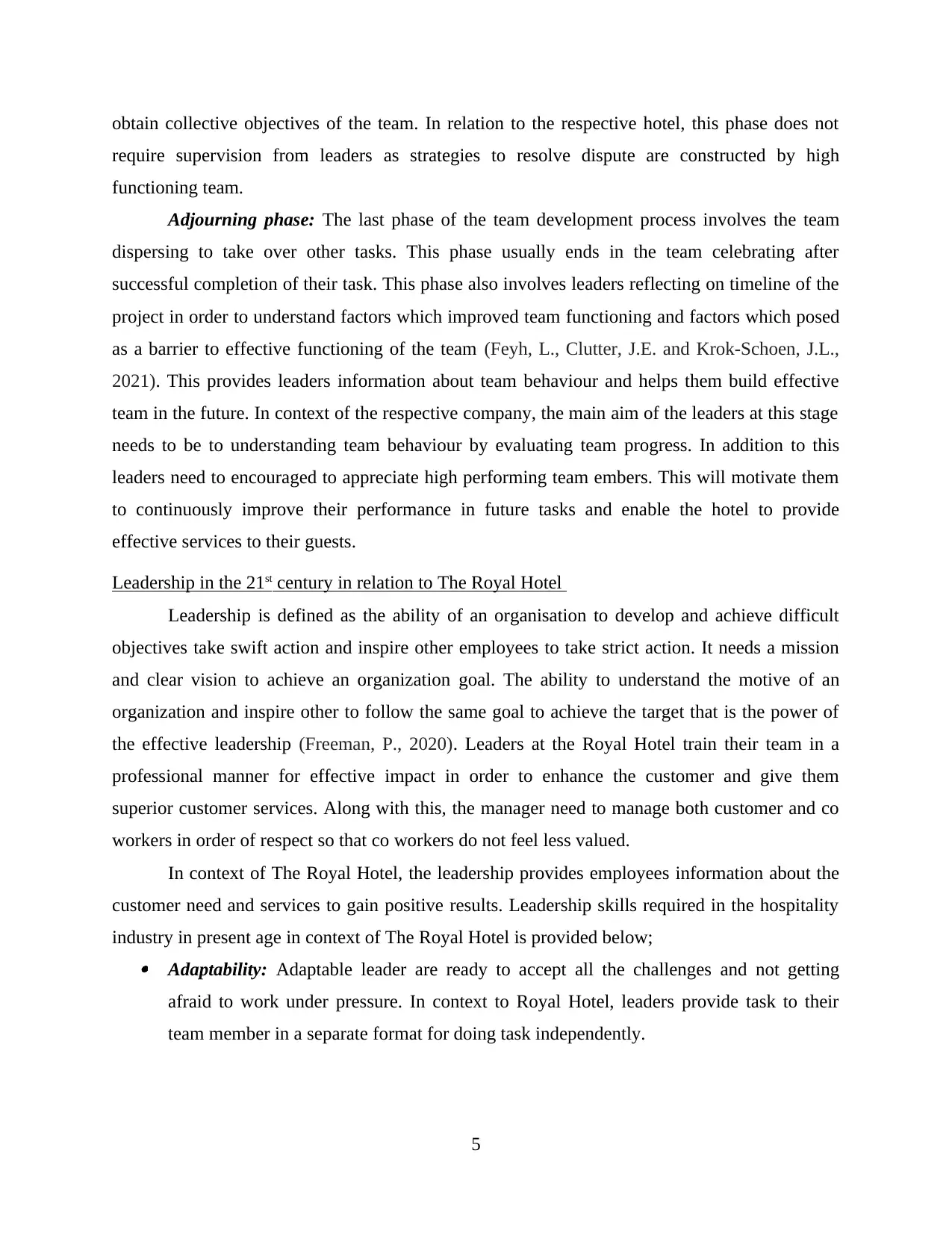
obtain collective objectives of the team. In relation to the respective hotel, this phase does not
require supervision from leaders as strategies to resolve dispute are constructed by high
functioning team.
Adjourning phase: The last phase of the team development process involves the team
dispersing to take over other tasks. This phase usually ends in the team celebrating after
successful completion of their task. This phase also involves leaders reflecting on timeline of the
project in order to understand factors which improved team functioning and factors which posed
as a barrier to effective functioning of the team (Feyh, L., Clutter, J.E. and Krok-Schoen, J.L.,
2021). This provides leaders information about team behaviour and helps them build effective
team in the future. In context of the respective company, the main aim of the leaders at this stage
needs to be to understanding team behaviour by evaluating team progress. In addition to this
leaders need to encouraged to appreciate high performing team embers. This will motivate them
to continuously improve their performance in future tasks and enable the hotel to provide
effective services to their guests.
Leadership in the 21st century in relation to The Royal Hotel
Leadership is defined as the ability of an organisation to develop and achieve difficult
objectives take swift action and inspire other employees to take strict action. It needs a mission
and clear vision to achieve an organization goal. The ability to understand the motive of an
organization and inspire other to follow the same goal to achieve the target that is the power of
the effective leadership (Freeman, P., 2020). Leaders at the Royal Hotel train their team in a
professional manner for effective impact in order to enhance the customer and give them
superior customer services. Along with this, the manager need to manage both customer and co
workers in order of respect so that co workers do not feel less valued.
In context of The Royal Hotel, the leadership provides employees information about the
customer need and services to gain positive results. Leadership skills required in the hospitality
industry in present age in context of The Royal Hotel is provided below; Adaptability: Adaptable leader are ready to accept all the challenges and not getting
afraid to work under pressure. In context to Royal Hotel, leaders provide task to their
team member in a separate format for doing task independently.
5
require supervision from leaders as strategies to resolve dispute are constructed by high
functioning team.
Adjourning phase: The last phase of the team development process involves the team
dispersing to take over other tasks. This phase usually ends in the team celebrating after
successful completion of their task. This phase also involves leaders reflecting on timeline of the
project in order to understand factors which improved team functioning and factors which posed
as a barrier to effective functioning of the team (Feyh, L., Clutter, J.E. and Krok-Schoen, J.L.,
2021). This provides leaders information about team behaviour and helps them build effective
team in the future. In context of the respective company, the main aim of the leaders at this stage
needs to be to understanding team behaviour by evaluating team progress. In addition to this
leaders need to encouraged to appreciate high performing team embers. This will motivate them
to continuously improve their performance in future tasks and enable the hotel to provide
effective services to their guests.
Leadership in the 21st century in relation to The Royal Hotel
Leadership is defined as the ability of an organisation to develop and achieve difficult
objectives take swift action and inspire other employees to take strict action. It needs a mission
and clear vision to achieve an organization goal. The ability to understand the motive of an
organization and inspire other to follow the same goal to achieve the target that is the power of
the effective leadership (Freeman, P., 2020). Leaders at the Royal Hotel train their team in a
professional manner for effective impact in order to enhance the customer and give them
superior customer services. Along with this, the manager need to manage both customer and co
workers in order of respect so that co workers do not feel less valued.
In context of The Royal Hotel, the leadership provides employees information about the
customer need and services to gain positive results. Leadership skills required in the hospitality
industry in present age in context of The Royal Hotel is provided below; Adaptability: Adaptable leader are ready to accept all the challenges and not getting
afraid to work under pressure. In context to Royal Hotel, leaders provide task to their
team member in a separate format for doing task independently.
5
Paraphrase This Document
Need a fresh take? Get an instant paraphrase of this document with our AI Paraphraser
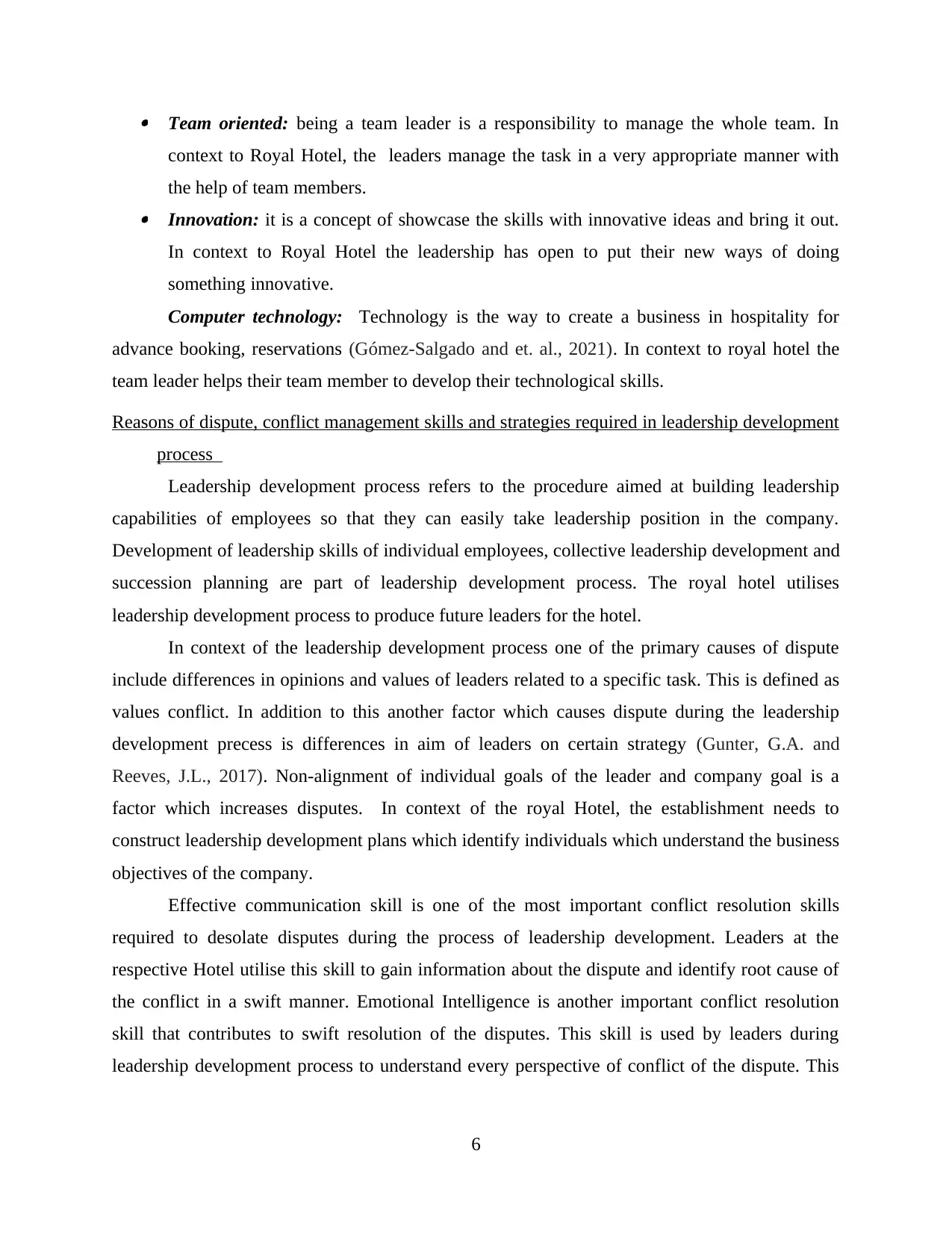
Team oriented: being a team leader is a responsibility to manage the whole team. In
context to Royal Hotel, the leaders manage the task in a very appropriate manner with
the help of team members. Innovation: it is a concept of showcase the skills with innovative ideas and bring it out.
In context to Royal Hotel the leadership has open to put their new ways of doing
something innovative.
Computer technology: Technology is the way to create a business in hospitality for
advance booking, reservations (Gómez‐Salgado and et. al., 2021). In context to royal hotel the
team leader helps their team member to develop their technological skills.
Reasons of dispute, conflict management skills and strategies required in leadership development
process
Leadership development process refers to the procedure aimed at building leadership
capabilities of employees so that they can easily take leadership position in the company.
Development of leadership skills of individual employees, collective leadership development and
succession planning are part of leadership development process. The royal hotel utilises
leadership development process to produce future leaders for the hotel.
In context of the leadership development process one of the primary causes of dispute
include differences in opinions and values of leaders related to a specific task. This is defined as
values conflict. In addition to this another factor which causes dispute during the leadership
development precess is differences in aim of leaders on certain strategy (Gunter, G.A. and
Reeves, J.L., 2017). Non-alignment of individual goals of the leader and company goal is a
factor which increases disputes. In context of the royal Hotel, the establishment needs to
construct leadership development plans which identify individuals which understand the business
objectives of the company.
Effective communication skill is one of the most important conflict resolution skills
required to desolate disputes during the process of leadership development. Leaders at the
respective Hotel utilise this skill to gain information about the dispute and identify root cause of
the conflict in a swift manner. Emotional Intelligence is another important conflict resolution
skill that contributes to swift resolution of the disputes. This skill is used by leaders during
leadership development process to understand every perspective of conflict of the dispute. This
6
context to Royal Hotel, the leaders manage the task in a very appropriate manner with
the help of team members. Innovation: it is a concept of showcase the skills with innovative ideas and bring it out.
In context to Royal Hotel the leadership has open to put their new ways of doing
something innovative.
Computer technology: Technology is the way to create a business in hospitality for
advance booking, reservations (Gómez‐Salgado and et. al., 2021). In context to royal hotel the
team leader helps their team member to develop their technological skills.
Reasons of dispute, conflict management skills and strategies required in leadership development
process
Leadership development process refers to the procedure aimed at building leadership
capabilities of employees so that they can easily take leadership position in the company.
Development of leadership skills of individual employees, collective leadership development and
succession planning are part of leadership development process. The royal hotel utilises
leadership development process to produce future leaders for the hotel.
In context of the leadership development process one of the primary causes of dispute
include differences in opinions and values of leaders related to a specific task. This is defined as
values conflict. In addition to this another factor which causes dispute during the leadership
development precess is differences in aim of leaders on certain strategy (Gunter, G.A. and
Reeves, J.L., 2017). Non-alignment of individual goals of the leader and company goal is a
factor which increases disputes. In context of the royal Hotel, the establishment needs to
construct leadership development plans which identify individuals which understand the business
objectives of the company.
Effective communication skill is one of the most important conflict resolution skills
required to desolate disputes during the process of leadership development. Leaders at the
respective Hotel utilise this skill to gain information about the dispute and identify root cause of
the conflict in a swift manner. Emotional Intelligence is another important conflict resolution
skill that contributes to swift resolution of the disputes. This skill is used by leaders during
leadership development process to understand every perspective of conflict of the dispute. This
6
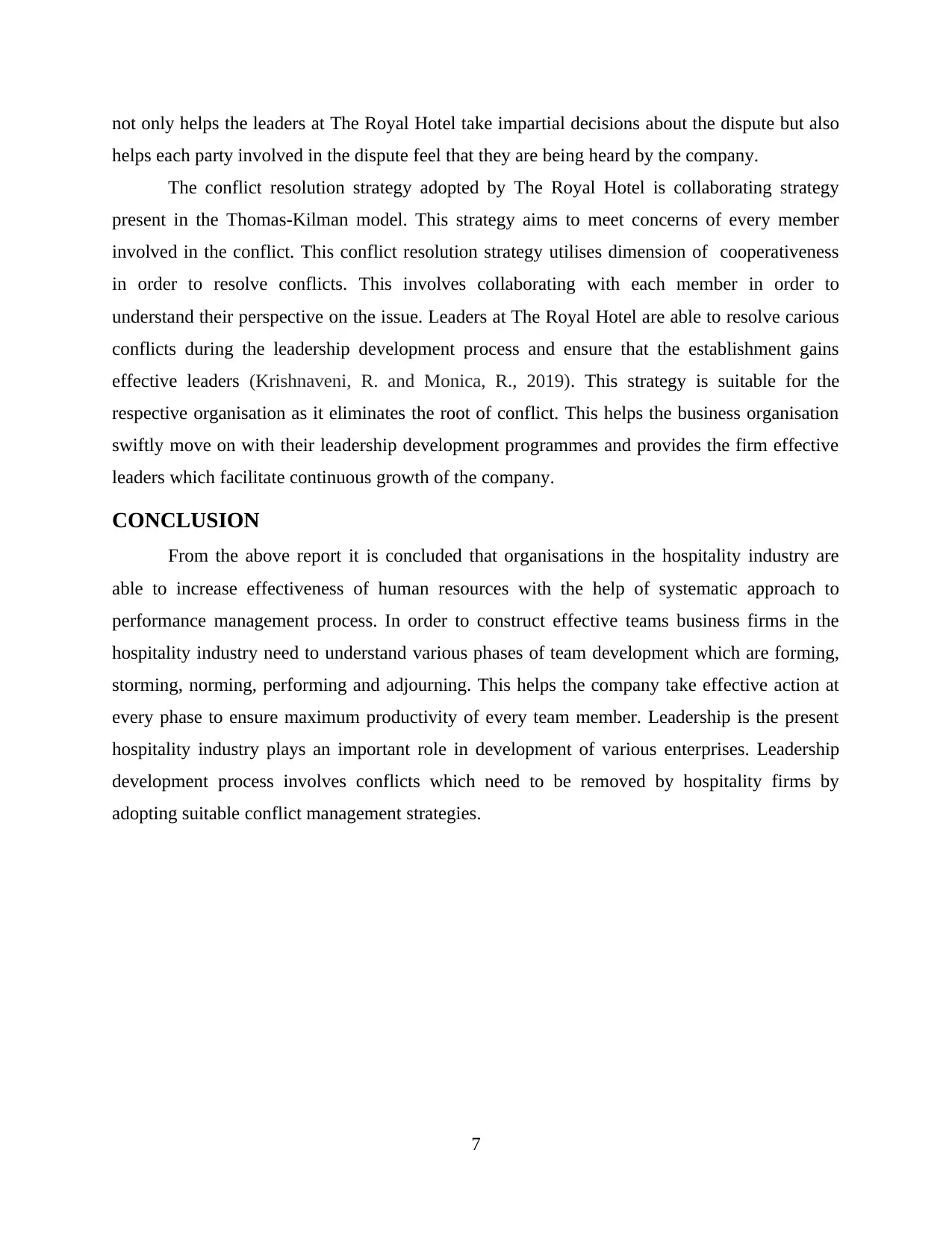
not only helps the leaders at The Royal Hotel take impartial decisions about the dispute but also
helps each party involved in the dispute feel that they are being heard by the company.
The conflict resolution strategy adopted by The Royal Hotel is collaborating strategy
present in the Thomas-Kilman model. This strategy aims to meet concerns of every member
involved in the conflict. This conflict resolution strategy utilises dimension of cooperativeness
in order to resolve conflicts. This involves collaborating with each member in order to
understand their perspective on the issue. Leaders at The Royal Hotel are able to resolve carious
conflicts during the leadership development process and ensure that the establishment gains
effective leaders (Krishnaveni, R. and Monica, R., 2019). This strategy is suitable for the
respective organisation as it eliminates the root of conflict. This helps the business organisation
swiftly move on with their leadership development programmes and provides the firm effective
leaders which facilitate continuous growth of the company.
CONCLUSION
From the above report it is concluded that organisations in the hospitality industry are
able to increase effectiveness of human resources with the help of systematic approach to
performance management process. In order to construct effective teams business firms in the
hospitality industry need to understand various phases of team development which are forming,
storming, norming, performing and adjourning. This helps the company take effective action at
every phase to ensure maximum productivity of every team member. Leadership is the present
hospitality industry plays an important role in development of various enterprises. Leadership
development process involves conflicts which need to be removed by hospitality firms by
adopting suitable conflict management strategies.
7
helps each party involved in the dispute feel that they are being heard by the company.
The conflict resolution strategy adopted by The Royal Hotel is collaborating strategy
present in the Thomas-Kilman model. This strategy aims to meet concerns of every member
involved in the conflict. This conflict resolution strategy utilises dimension of cooperativeness
in order to resolve conflicts. This involves collaborating with each member in order to
understand their perspective on the issue. Leaders at The Royal Hotel are able to resolve carious
conflicts during the leadership development process and ensure that the establishment gains
effective leaders (Krishnaveni, R. and Monica, R., 2019). This strategy is suitable for the
respective organisation as it eliminates the root of conflict. This helps the business organisation
swiftly move on with their leadership development programmes and provides the firm effective
leaders which facilitate continuous growth of the company.
CONCLUSION
From the above report it is concluded that organisations in the hospitality industry are
able to increase effectiveness of human resources with the help of systematic approach to
performance management process. In order to construct effective teams business firms in the
hospitality industry need to understand various phases of team development which are forming,
storming, norming, performing and adjourning. This helps the company take effective action at
every phase to ensure maximum productivity of every team member. Leadership is the present
hospitality industry plays an important role in development of various enterprises. Leadership
development process involves conflicts which need to be removed by hospitality firms by
adopting suitable conflict management strategies.
7
⊘ This is a preview!⊘
Do you want full access?
Subscribe today to unlock all pages.

Trusted by 1+ million students worldwide
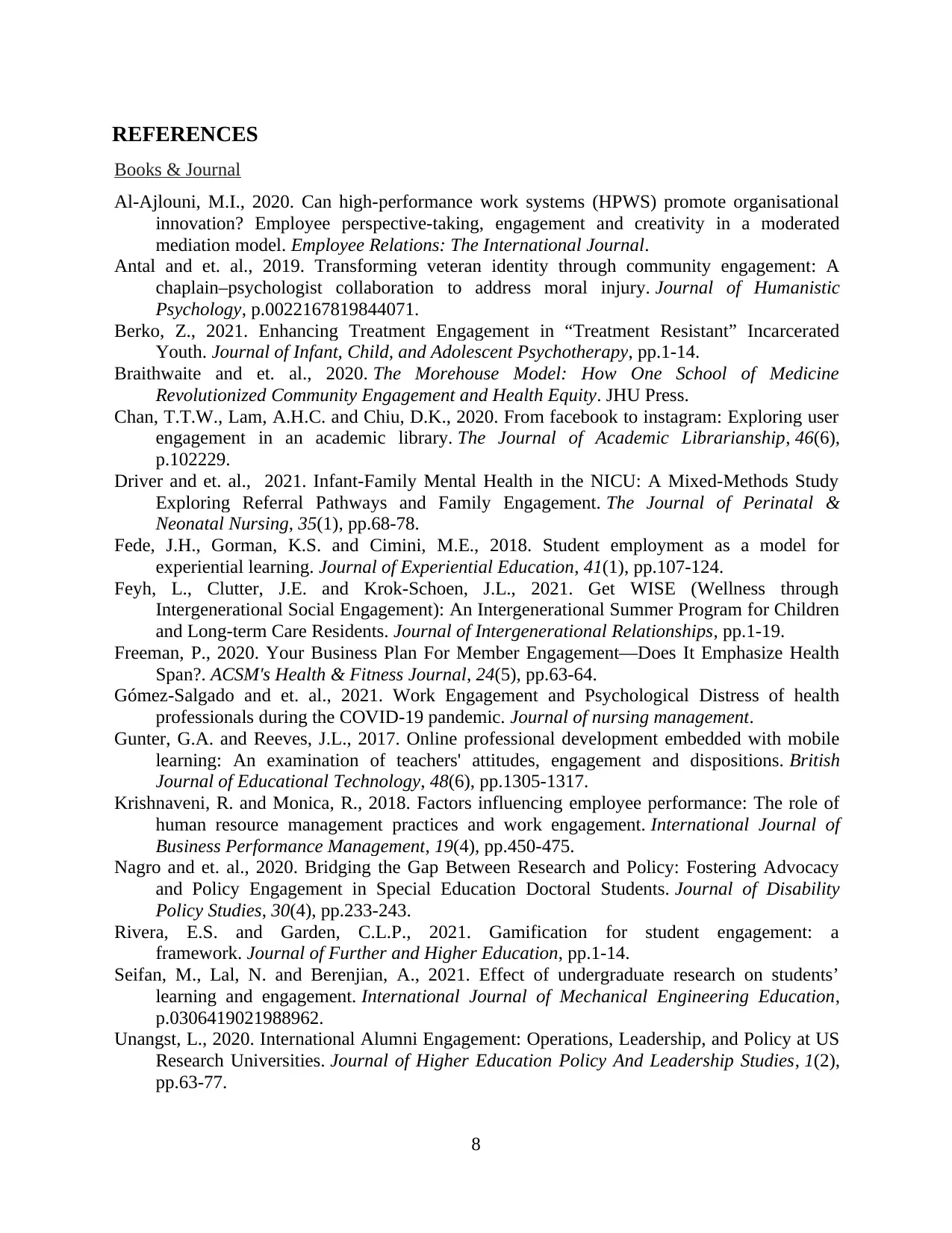
REFERENCES
Books & Journal
Al-Ajlouni, M.I., 2020. Can high-performance work systems (HPWS) promote organisational
innovation? Employee perspective-taking, engagement and creativity in a moderated
mediation model. Employee Relations: The International Journal.
Antal and et. al., 2019. Transforming veteran identity through community engagement: A
chaplain–psychologist collaboration to address moral injury. Journal of Humanistic
Psychology, p.0022167819844071.
Berko, Z., 2021. Enhancing Treatment Engagement in “Treatment Resistant” Incarcerated
Youth. Journal of Infant, Child, and Adolescent Psychotherapy, pp.1-14.
Braithwaite and et. al., 2020. The Morehouse Model: How One School of Medicine
Revolutionized Community Engagement and Health Equity. JHU Press.
Chan, T.T.W., Lam, A.H.C. and Chiu, D.K., 2020. From facebook to instagram: Exploring user
engagement in an academic library. The Journal of Academic Librarianship, 46(6),
p.102229.
Driver and et. al., 2021. Infant-Family Mental Health in the NICU: A Mixed-Methods Study
Exploring Referral Pathways and Family Engagement. The Journal of Perinatal &
Neonatal Nursing, 35(1), pp.68-78.
Fede, J.H., Gorman, K.S. and Cimini, M.E., 2018. Student employment as a model for
experiential learning. Journal of Experiential Education, 41(1), pp.107-124.
Feyh, L., Clutter, J.E. and Krok-Schoen, J.L., 2021. Get WISE (Wellness through
Intergenerational Social Engagement): An Intergenerational Summer Program for Children
and Long-term Care Residents. Journal of Intergenerational Relationships, pp.1-19.
Freeman, P., 2020. Your Business Plan For Member Engagement—Does It Emphasize Health
Span?. ACSM's Health & Fitness Journal, 24(5), pp.63-64.
Gómez‐Salgado and et. al., 2021. Work Engagement and Psychological Distress of health
professionals during the COVID‐19 pandemic. Journal of nursing management.
Gunter, G.A. and Reeves, J.L., 2017. Online professional development embedded with mobile
learning: An examination of teachers' attitudes, engagement and dispositions. British
Journal of Educational Technology, 48(6), pp.1305-1317.
Krishnaveni, R. and Monica, R., 2018. Factors influencing employee performance: The role of
human resource management practices and work engagement. International Journal of
Business Performance Management, 19(4), pp.450-475.
Nagro and et. al., 2020. Bridging the Gap Between Research and Policy: Fostering Advocacy
and Policy Engagement in Special Education Doctoral Students. Journal of Disability
Policy Studies, 30(4), pp.233-243.
Rivera, E.S. and Garden, C.L.P., 2021. Gamification for student engagement: a
framework. Journal of Further and Higher Education, pp.1-14.
Seifan, M., Lal, N. and Berenjian, A., 2021. Effect of undergraduate research on students’
learning and engagement. International Journal of Mechanical Engineering Education,
p.0306419021988962.
Unangst, L., 2020. International Alumni Engagement: Operations, Leadership, and Policy at US
Research Universities. Journal of Higher Education Policy And Leadership Studies, 1(2),
pp.63-77.
8
Books & Journal
Al-Ajlouni, M.I., 2020. Can high-performance work systems (HPWS) promote organisational
innovation? Employee perspective-taking, engagement and creativity in a moderated
mediation model. Employee Relations: The International Journal.
Antal and et. al., 2019. Transforming veteran identity through community engagement: A
chaplain–psychologist collaboration to address moral injury. Journal of Humanistic
Psychology, p.0022167819844071.
Berko, Z., 2021. Enhancing Treatment Engagement in “Treatment Resistant” Incarcerated
Youth. Journal of Infant, Child, and Adolescent Psychotherapy, pp.1-14.
Braithwaite and et. al., 2020. The Morehouse Model: How One School of Medicine
Revolutionized Community Engagement and Health Equity. JHU Press.
Chan, T.T.W., Lam, A.H.C. and Chiu, D.K., 2020. From facebook to instagram: Exploring user
engagement in an academic library. The Journal of Academic Librarianship, 46(6),
p.102229.
Driver and et. al., 2021. Infant-Family Mental Health in the NICU: A Mixed-Methods Study
Exploring Referral Pathways and Family Engagement. The Journal of Perinatal &
Neonatal Nursing, 35(1), pp.68-78.
Fede, J.H., Gorman, K.S. and Cimini, M.E., 2018. Student employment as a model for
experiential learning. Journal of Experiential Education, 41(1), pp.107-124.
Feyh, L., Clutter, J.E. and Krok-Schoen, J.L., 2021. Get WISE (Wellness through
Intergenerational Social Engagement): An Intergenerational Summer Program for Children
and Long-term Care Residents. Journal of Intergenerational Relationships, pp.1-19.
Freeman, P., 2020. Your Business Plan For Member Engagement—Does It Emphasize Health
Span?. ACSM's Health & Fitness Journal, 24(5), pp.63-64.
Gómez‐Salgado and et. al., 2021. Work Engagement and Psychological Distress of health
professionals during the COVID‐19 pandemic. Journal of nursing management.
Gunter, G.A. and Reeves, J.L., 2017. Online professional development embedded with mobile
learning: An examination of teachers' attitudes, engagement and dispositions. British
Journal of Educational Technology, 48(6), pp.1305-1317.
Krishnaveni, R. and Monica, R., 2018. Factors influencing employee performance: The role of
human resource management practices and work engagement. International Journal of
Business Performance Management, 19(4), pp.450-475.
Nagro and et. al., 2020. Bridging the Gap Between Research and Policy: Fostering Advocacy
and Policy Engagement in Special Education Doctoral Students. Journal of Disability
Policy Studies, 30(4), pp.233-243.
Rivera, E.S. and Garden, C.L.P., 2021. Gamification for student engagement: a
framework. Journal of Further and Higher Education, pp.1-14.
Seifan, M., Lal, N. and Berenjian, A., 2021. Effect of undergraduate research on students’
learning and engagement. International Journal of Mechanical Engineering Education,
p.0306419021988962.
Unangst, L., 2020. International Alumni Engagement: Operations, Leadership, and Policy at US
Research Universities. Journal of Higher Education Policy And Leadership Studies, 1(2),
pp.63-77.
8
Paraphrase This Document
Need a fresh take? Get an instant paraphrase of this document with our AI Paraphraser

9
1 out of 11
Related Documents
Your All-in-One AI-Powered Toolkit for Academic Success.
+13062052269
info@desklib.com
Available 24*7 on WhatsApp / Email
![[object Object]](/_next/static/media/star-bottom.7253800d.svg)
Unlock your academic potential
Copyright © 2020–2026 A2Z Services. All Rights Reserved. Developed and managed by ZUCOL.





